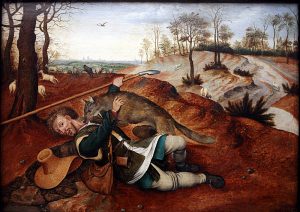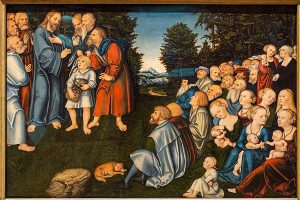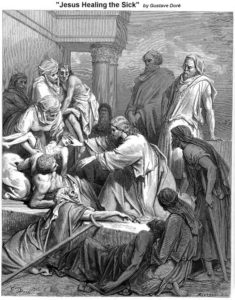Thoughts on Sunday’s Lessons for July 21, 2024 (Pentecost 9B/Proper 11)

The Good Shepherd, (1616), oil painting on canvas by Pieter Brueghel the Younger (1564-1638). Musées royaux des Beaux-Arts de Belgique, Brussels, Belgium. (Click image to enlarge.)
First Reading (Track One): 2 Samuel 7:1-14a
As our Track One first readings continue following the life of King David, remember that David’s genealogy is the Messianic line that Christians trace down the ages as the ancestry of Jesus. In Sunday’s Track One first reading, David – having consolidated Israel and Judah under his rule – becomes concerned that the people’s custom of keeping the Ark of the Covenant in a mere tent is insufficient to reflect the greatness of God. David decides to build a great temple to hold the Ark in a place of honor. But God, speaking through the prophecy of Nathan, dismisses this idea. God’s home, Nathan declares, is with the House of David: the dynasty of God’s people.
First Reading (Track Two): Jeremiah 23:1-6
Sunday we will read about the Good Shepherd in Psalm 23 and Mark’s allusion to the crowds following Jesus as “sheep without a shepherd” in the Gospel. First, though, the Prophet Jeremiah reminds us that, counter to the image of God as loving shepherd, there are bad shepherds who would destroy the flock and send its sheep running away. God will attend to these evildoers, the prophet says, envisioning the Temple restored on Mount Zion and a successor seated on King David’s throne. Then, Jeremiah foretells, the sheep will be gathered in when the people return to Jerusalem.
Psalm (Track One): Psalm 89:20-37
This passage from the middle portion of Psalm 89 celebrates God’s covenant with David and his descendants, a royal family that God made to endure forever. David’s line would last even through war’s devastation and exile’s pain, the Psalmist sings; David’s line would remain in spite of fears of God’s wrath over the nation having broken its covenant. Yes, the people’s iniquities might bring punishment, the rod and the lash, but their actions will never take away God’s love nor prevent the rise of a new David, Messiah and King.
Psalm (Track Two): Psalm 23
This week we turn again to the beloved 23rd Psalm. We hear its verses so often that most of us probably can read along without looking at the words. Psalm 23 appears five times during the three-year Lectionary cycle, and it also is often chosen for funeral services. Surely it is so popular because of its assurance that God’s goodness and mercy are always with us. Reading the psalm, feeling the comforting presence of the Shepherd, puts us back in touch with God’s restoring grace.
Second Reading: Ephesians 2:11-22
The author of the letter to the Ephesians takes pains to assure this early community’s Jewish Christians and Gentile Christians that all are fully invested in the community. All have become one through Christ Jesus: Jesus is the cornerstone who brings near even those who were far away. At the time of this writing, late in the first century after the fall of the Temple, Jewish Christianity and rabbinic Judaism were splitting apart. Christianity was actively gathering in Gentile converts, and sought to emphasize the promise that all had become one in Christ.
Gospel: Mark 6:30-34, 53-56
The apostles have returned from their mission to go out in pairs, healing and teaching the good news. They’re eager to tell their stories, but bone-weary, too, so Jesus invites them to go off in a boat to find a deserted place to rest. The excited crowds follow them around the shore to meet them, though, and a compassionate Jesus can’t help responding. These sheep needed a shepherd. Then (after the Lectionary skips over two familiar stories about the loaves and fishes and Jesus walking on water) they finally land at Gennesaret on the other side of the lake. Here, too, people come running like a huge flock of sheep to see Jesus, and he willingly touches and heals all who seek him.


